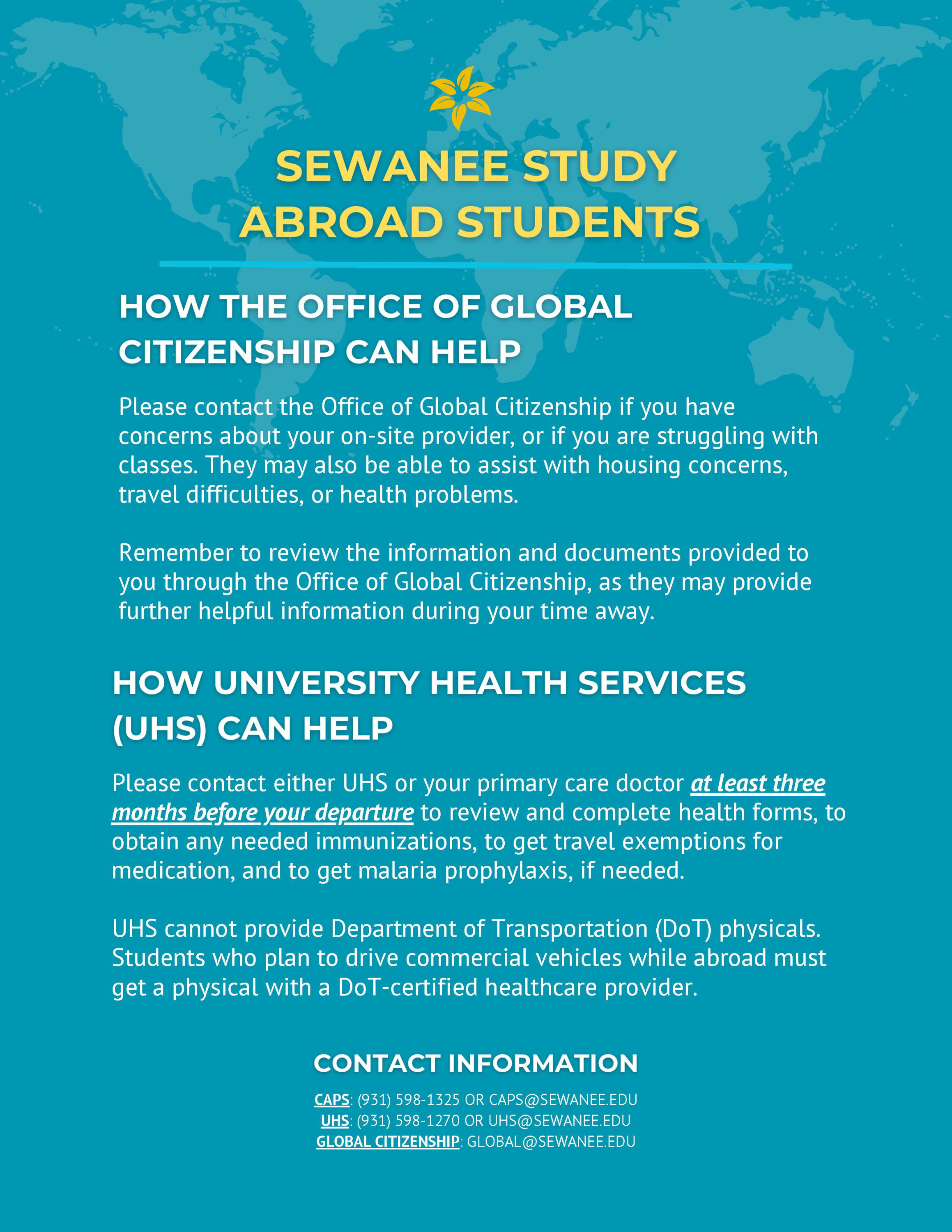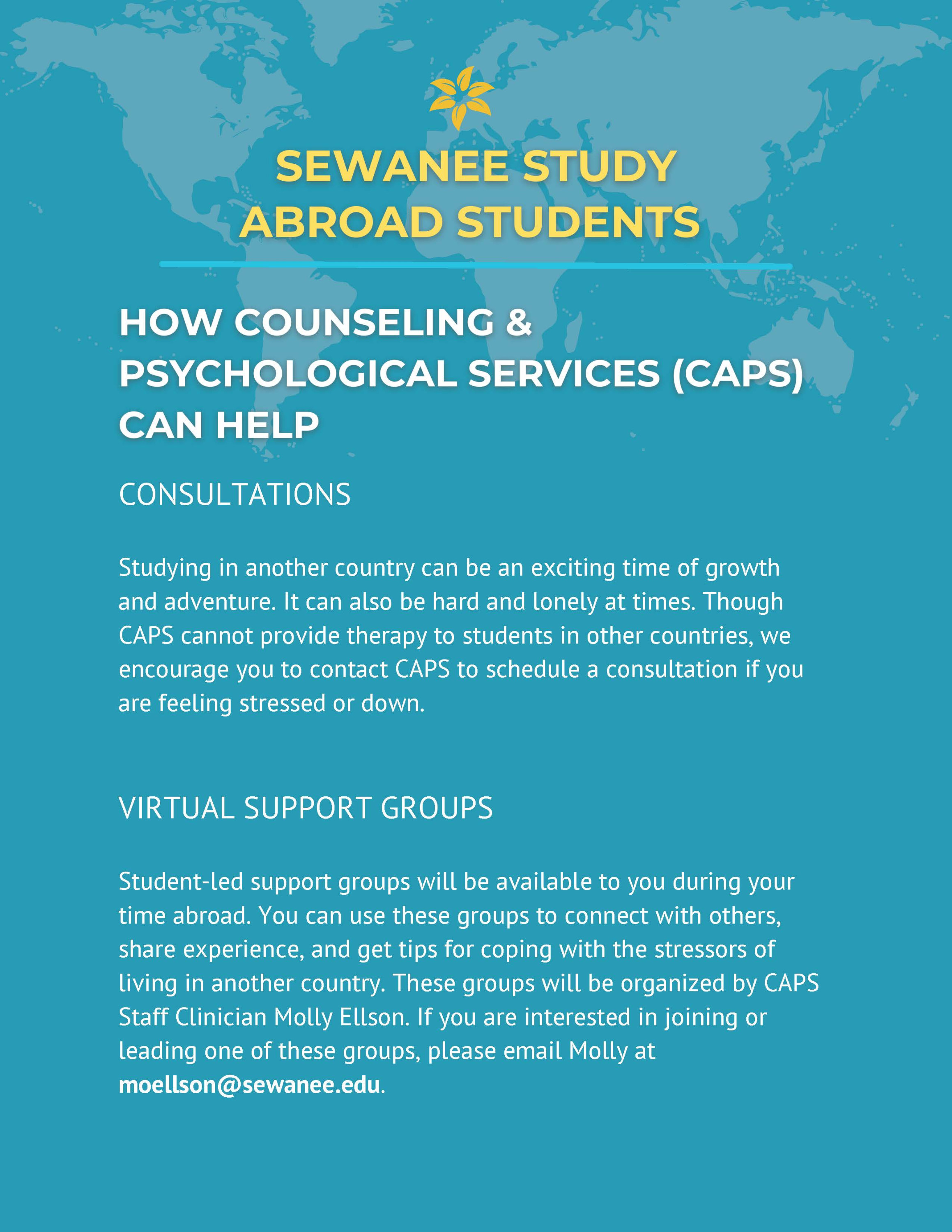We give families the information they need so they can best support their students as they embark on the exciting journey of study abroad.
To help students and families plan for the study abroad experience, the Office of Global Citizenship has organized useful information and advice into the following sections:
Safety and Risk Management
Health and Well-being
Financial Matters
FERPA and Communications
Title IX
Supporting Your Student
Understanding Study Away
Safety & Risk Management
Today, there is some inherent risk wherever one travels today. A study published by the Forum on Education Abroad has also shown that the risk of death to students is twice as high on college campuses in the U.S. than it is while studying abroad. Rather than shy away from studying away from Sewanee or ignore risk of being abroad, Sewanee’s approach is to assess and mitigate risk. We have carefully screened our approved program providers, and they have well-developed safety measures at their program sites. Before students depart for programs, the Office of Global Citizenship consults with the U.S. State Department’s webpage for travel warnings for locales. In addition, we are developing a system to provide information about risk and security alerts through an app on students’ cell phones. Some of our program providers require students to carry cell phones at all times to provide alerts about risks that may arise.
Below is a set of good practices students should observe prior to and while abroad:
- Check the international travel section of the U.S. Department of State's website for government-sponsored information regarding travel abroad, individual country profiles, travel alerts, travel warnings, and worldwide cautions.
- Register with the Smart Traveler Enrollment Program (STEP) to provide the Department of State with information that can be used to better assist them in the case of an emergency.
- Avoid hanging out in crowded places and tourist areas where pickpockets may operate and that may be sites of attacks.
- Do not participate in political events as they may turn violent or anti-U.S. Observe from a distance or in the news.
- Avoid dangerous and poorly lit areas, especially at night. When traveling at night, walk in pairs or small groups.
- Try to defuse altercations and avoid getting into heated arguments.
- Understand their rights and responsibilities under Title IX.
- Take any immediate actions necessary to protect their safety and/or welfare.
Emergency Contact Information
If you have general questions about study away, please contact global@sewanee.edu.
For questions about international students and scholars, contact Travis Parker at tbparker@sewanee.edu.
Health & WellNess
Studying away from Sewanee in the U.S. or abroad can be rewarding and exhilarating, but it can also be physically and psychologically challenging. While abroad, students are likely to encounter health problems and, very rarely, political or terrorist events that are dangerous. Such risks are real but careful preparation can mitigate them. The most likely challenges that students will encounter are health-related. In addition to differences in water and air pollution, hygiene standards vary by country, all of which can lead to illness for those who are not vigilant to guard against unnecessary health risks. The Center for Disease Control is an excellent source of information on how to avoid illnesses abroad and inoculations that you may need to receive from a local health specialist to help mitigate the risk of illness.
The Office of Global Citizenship wants all students to have opportunities to study away from Sewanee, if they wish, but when considering off-campus study opportunities, students and families should also frankly weigh the physical and emotional difficulties that students may encounter while away. Students who have mental health challenges will, at minimum, need to make arrangements to have access to medicine and/or counseling for the duration of their time away. Students and parents also need to recognize that laws and regulations on mental health provision differ from our own. For example, if a person in the U.K., even if not a citizen of that country, requires psychological counseling and is found to have suicidal tendencies, the person can be “sectioned” or placed in the custody of a mental health institution. Similarly countries have varying regulations and laws for people who require accommodations due to physical disabilities or challenges, which may make some program activities less accessible for some students than others. None of these considerations inherently prevent students from studying abroad, but students and families should consider these issues when considering whether study away is advisable and which programs are appropriate for the student.
The Office of Global Citizenship partners with Sewanee's University Health Services (UHS) and Counseling & Psychological Services (CAPS) to support students needs before, during, and after studying abroad or away.


Financial Matters
Programs vary in their charges, but Sewanee’s billing system allows students and their families to have a predictable educational expense when they study abroad. The billing system also helps Sewanee to offer financial aid to students while they are abroad. Students can then make decisions on selecting a study abroad program on the content of the program rather than solely on price.
Under the Sewanee Pledge, students can apply their Sewanee institutional aid (scholarships, grants, loans) to approved semester-long study away programs; as a result, they pay the same charges (tuition, room, board, and fees) that they would typically pay to study at Sewanee. Sewanee then pays the providers of the programs for the standard tuition, room and board of their programs. Different regulations apply for summer study away, but pell-eligible students may be able to apply for additional funds for summer study away. For more information on the Sewanee Pledge, download the FAQs. Unlike many schools, Sewanee does not levy additional charges for participating on study away/study abroad and treats Sewanee-run and third-party programs equally. Because students are traveling to another country to study, there will be additional costs. These costs are the responsibility of the student, and they are outlined below:
- International airfare to and from the international destination
- Additional course fees
- Additional room fees
Some study abroad programs offer a variety of housing options, including apartments and single rooms at an additional charge. If study abroad participants select such options, the student will be responsible for paying such additional charges. - Non-program costs, including in-country travel, visa, passport, books, etc.
- Any additional costs if a study abroad program is more expensive than Sewanee’s comprehensive tuition & fees
If a study abroad program's basic housing package does not provide room or full board, Sewanee’s treasurer’s office will credit the student's account for the uncovered portion (on a pro rata basis for board). Board credits are based on the base housing option that offers the most meals.
We fully recognize that studying abroad can be costly, so we encourage students to apply for additional scholarships through their provider, through governmental organizations, and through non-profits. Students are eligible to receive up to 50% of the amount of any financial aid awarded by a program provider. Opportunities can be found here.
Students may use a 529 Plan to cover expenses associated with study abroad, such as room, board, tuition, books, supplies, etc. Some expenses that aren't 529 plan eligible include: Airfare, train tickets, other travel expenses, international health insurance, and personal expenses while abroad.
Families and students should also consider making a budget based on their study abroad goals. Below are websites that provide educational resources on budgeting while on study abroad.
- Study Abroad Budget Guide
- How to Budget for Study Abroad
- Diversity Abroad Tips for Study Abroad Budgets
- Can You Use a 529 Plan to Pay for Study Abroad
- The Only Student Travel Budget Planner You'll Ever Need
Ferpa & Communications
The Office of Global Citizenship primarily communicates with students in order to encourage their acceptance of responsibility to communicate with their families and because of limitations that Family Educational Rights and Privacy Act (FERPA) places on communication of some types of information with parents and guardians. According to FERPA, the Office of Global Citizenship may release to families general information about the students’ study abroad programs, similar to what may be found on the study abroad programs’ websites. Without authorization from students, the Office may not release information related to their course selection, grades, billing and account information, and housing and contact information abroad. We encourage families to discuss with their children before they leave to study off campus in order to establish their own methods of communicating. In the case of a crisis situation that may arise in a study abroad site, FERPA allows the Office to communicate information about the student’s well-being to the family. The University’s interpretation of FERPA and how it affects our communications may be found here. Before studying abroad, students are asked to complete an emergency communication form that details who Sewanee may contact in the case of an emergency.
Title IX
Title IX of the Education Amendments of 1972 protects people from sex discrimination in educational programs and activities at institutions that receive federal financial assistance. The University is committed to providing an environment free from discrimination on the basis of sex, which includes sexual misconduct. Dr. Sylvia Gray is Sewanee's Title IX coordinator, and she can be reached at titleix@sewanee.edu. For more information on Title IX at Sewanee, please review the Title IX Office Website.
Supporting your student
It may seem unnecessary to say, but it is important for families and friends to support students who study abroad. There are two common unhelpful ways of interacting with a student abroad. First, excessive hovering over the student may prove a burden for the student and stunt the student’s personal growth while abroad. Leeway to explore and be challenged encourages the student to mature and develop as a young adult. In addition, families should be cognizant that a student may go through culture shock while abroad, leading to a longing for home. Limiting real-time forms of communication such as phone calls, texting and skyping will help the student abroad to focus on the host community rather than home. At the same time, it is important to provide the student a sense of security and connection to home while abroad. Striking the right balance will vary for each family and friend, but families and friends should seek to reduce unnecessary communication, as hard as that may be. One of our approved providers, DIS, provides good, basic advice on how families can support students while abroad, as well as prepare them to go abroad. Some study abroad program providers recommend limiting phone conversations with family and friends to once per week. Students may wish to use social media to update their friends and family on their explorations in order to reduce the need for direct contact.
A second problem that sometimes arises with students abroad is unconscious resentment toward the student. While a student goes abroad and has new, exciting experiences, family members and friends naturally may feel a twinge of jealousy or bitterness about being left behind. When the student returns from abroad, lingering resentment may come to surface, sometimes unexpectedly or unconsciously. For their part, students who return home likely will experience a form of reverse culture shock, which can cause the student to seem distant. Remaining alert to such feelings is a good way for both the returned student and the families and friends of the returned student to address them and to prevent them from harming relations after the student returns home.
Understanding Study Away
We encourage families to understand the various types of study away and study abroad opportunities offered at Sewanee, as well as the general process for applying. This allows students and families to navigate the process together.

